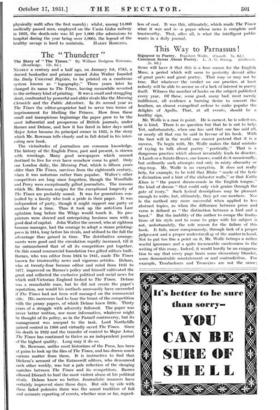The " Thunderer "
The Story of " The Times." By William Dodgson Bowman. (Routledge. 12s. 6d.) NEARLY a century and a half ago, on January 1st, 1783, a shrewd. bookseller and printer named John Walter founded.
. .
the Daily Universal Register, to be printed on a cumbrous system known as " logography." Three years later he changed its name to The Times, having meanwhile- reverted to the ordinary kind of printing; - Itwas a small and struggling sheet, Confronted by powerful and abler rivals like the Morning Chronicle and the Public Advertiser. In its second year as The Times the editor-proprietor had to serve two terms of imprisonment for libelling the Princes. How from these small and inauspicious beginnings the paper grew to be the most influential and prosperous of British journals, under Barnes and Delane, and how it has fared in later days until Major Astor became its principal owner in 1922, is the story which Mr. Bowman tells clearly and in full detail in his inter- esting new book.
The vicissitudes of journalism are common knowledge. The history of the .English Press, past and present, is strewn with wreckage. Many good newspapers which seemed destined to live for ever have somehow come to grief. Only one London daily, the Morning Post, which is fifteen years older than The Times, survives from the eighteenth century, when it was notorious rather than popular. Walter's other competitors are long since forgotten, though the Woodfalls and Perry were exceptionally gifted journalists. The reasons which Mr. Bowman assigns for the exceptional longevity of The Times are probably sound. It was for generations con- trolled by a family who took a pride in their paper. It was independent of party, though it might support one party or another for a time. Thus it took up. the anti-Corn Law agitation long before the Whigs would touch it. Its pro- prietors were shrewd and enterprising business men with a good deal of capital. John Walter the second, who at eighteen became manager, had the courage to adopt a steam printing- press in 1814, long before his rivals, and utilised to the full the advantage thus gained in time. The distributive arrange- ments were good and the circulation rapidly increased, till it far outnumbered that of all its competitors put together. On this sound commercial foundation two gifted editors built. Barnes, who was editor from 1824 to 1841, made The Times known for trustworthy news and vigorous articles. Delane, who at twenty-four became editor and ruled from 1841 to 1877, improved on Barnes's policy and himself cultivated the great and collected the exclusive political and social news for which mid-Victorian England looked to The Times. Delane was a remarkable man, but he did not create the paper's reputation, nor would his methods necessarily have succeeded if The Times had not been well managed on the commercial side. His successors had to bear the brunt of the competition with the penny papers, of which Delane knew little. Thirty years of a struggle with adversity followed. The paper was never better written, nor more informative, whatever might be thought of its policy, as in the Parnell controversy, but its management was unequal to the task. Lord Northcliffe gained control in 1908 and virtually saved The Times. Since his death in 1922 and the transfer of control to Major Astor, The Times has continued to thrive as an independent journal of the highest quality. Long may it do so.
Mr. Bowman, unlike most historians of the Press, has been at pains to look up the files of The Times, and has drawn much curious matter from them. It is instructive to fmd that Dickens's account of the Eatanswill editors, who denounced each other weekly, was but a pale reflection of the slanging matches between The Times and its competitors. Barnes allowed Disraeli to hurl the most violent abuse at his political rivals. Delane knew no better. Journalistic manners have certainly improved since those days. But side by side with these faded polemics there was the sound tradition of full and accurate reporting of events, whether near or far, regard-
less of cost. It was this, ultimately, which made, The Times what it was and is—a paper whose news is complete and trustworthy. That, after all, is what the intelligent public wants in a daily journal.






































 Previous page
Previous page